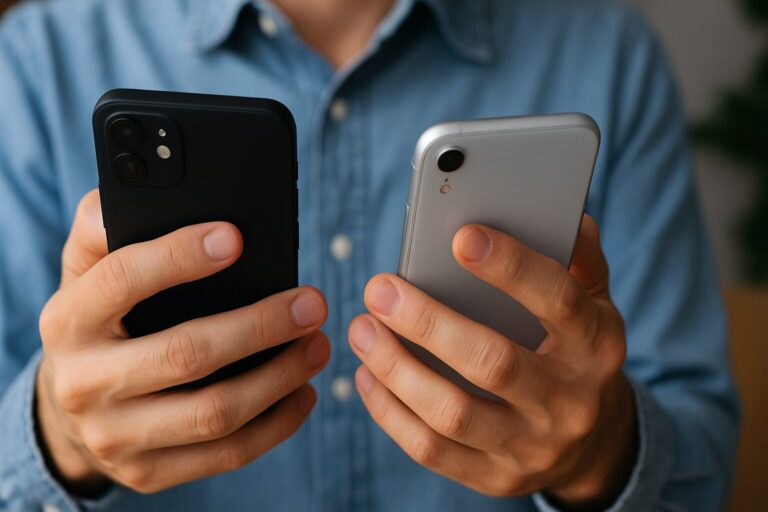You’ve probably seen them: the person at the café who flips between two smartphones like a juggler with a trick up their sleeve. One buzzes with work emails, the other flashes a text from a group chat. It looks efficient. Maybe excessive. But it’s rarely random.
People who carry two phones often aren’t just practical. They’re broadcasting something about how they operate in the world. And while there’s no universal rulebook, the pattern tends to cluster around three very distinct personality types.
1. The Compartmentalizer
This is the person who draws sharp boundaries between different parts of life. They need tools that enforce those lines. One phone for work. One for personal life. No mixing, no overlap, no chance of a boss texting during dinner.
Compartmentalizers aren’t necessarily privacy-obsessed. They’re more about structure. They believe in focused attention and clean transitions. When they’re off the clock, they want to be off the clock. One phone powers down, and the other takes over.
These are often people with jobs that demand 24/7 availability (lawyers, doctors, IT administrators). Still, they want to preserve a sense of separation. This is about being reachable only when necessary.
Psychologically, this maps closely to high conscientiousness. Studies link conscientiousness with routines, order, and goal-setting. In practice, it can mean someone who doesn’t just aim to be organized. They build their whole digital environment around the idea.
And they tend to be less susceptible to burnout. Why? Because they have clear mental “containers” for stress. Phone off, mind off.
2. The Image Curator
For this person, two phones aren’t about boundaries. They’re about control. One phone is the polished storefront (the version of them the world is meant to see). The other? That’s backstage.
This type is especially common in public-facing roles: influencers, CEOs, real estate agents, anyone whose reputation carries weight. One phone might be full of business contacts, calendar reminders, and curated Instagram posts. The other could house more personal or even impulsive communication—raw, unfiltered, and unbranded.
It’s not deception. It’s orchestration.
Social psychologist Erving Goffman described human interaction as a kind of stage play. We perform roles depending on our context. People with two phones often take this to a literal level. They divide their devices the same way an actor changes costumes.
From a behavioral standpoint, this suggests a high degree of social awareness (or social anxiety, depending on how you frame it). Either way, it reveals a preoccupation with presentation. Not because they’re shallow. Because they’re strategic.
And yes, it also reflects a certain emotional caution. These individuals tend to protect their private lives fiercely, even when their public ones look fully exposed.
3. The Control-Seeker (or the Chaos-Wrangler)
Not everyone who uses two phones is organized. Some are exactly the opposite. They’re not dividing to simplify. They’re trying to cope with a mess.
This person has three email addresses, five group chats, and a notes app that’s grown into a manifesto. They don’t want two phones. They need them.
For some, this is a survival tactic. Maybe their job never ends, so the second phone is just a buffer against total overload. For others, it’s more about psychological safety. They fear loss of data, missed messages, or one device going dead during a crisis. So they hedge.
It might look over the top, but it often comes from real experience. Missing a key call, getting hacked, or losing important files once and swearing “never again.” Redundancy becomes comfort.
These people aren’t just cautious. They’re what researchers call “maximizers.” Maximizers want the best outcome in every situation, and they don’t settle easily. In some studies, they show higher stress and regret, but also higher achievement in certain tasks.
Two phones, in this case, are a symptom of deeper patterns: chronic multitasking, fear of failure, and a relentless desire to stay in control. Ironically, it doesn’t always look controlled. But it serves a purpose.
What It Doesn’t Always Mean
Let’s get one myth out of the way. Carrying two phones doesn’t automatically signal secrecy or infidelity. Pop culture loves this trope (the cheater with a “burner phone”) but in reality, most people who use two phones aren’t hiding affairs. They’re managing demands.
It also doesn’t always mean wealth. While some people carry a personal iPhone and a company-paid Samsung, others are juggling an ancient Android and a mid-range model because they can’t consolidate accounts or afford a better solution.
Sometimes, it’s not personality. It’s policy.
Why This Matters
It’s easy to reduce people to their gadgets. But our relationship with technology (especially something as personal as a phone) is often a mirror. It reflects our needs, our boundaries, our fears, and our values.
And unlike clothing or conversation, phones are persistent. You wear them. You respond to them. You build habits around them. Which means they don’t just express identity. They shape it.
Carrying two phones isn’t inherently better or worse than carrying one. But the reasons people do it tell you a lot about how they think. Whether it’s to protect peace, preserve image, or maintain a grip on the chaos, it all comes back to how we navigate modern life.
Which Type Are You?
If you use two phones, or have ever considered it, ask yourself: is this about control, clarity, or curation? Are you trying to keep things separate… or trying to hold it all together?
Because in the end, your devices aren’t just tools. They’re clues. And every buzz, swipe, and charged battery is part of the story you’re telling—even if it’s only to yourself.
